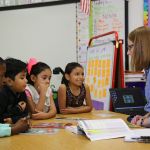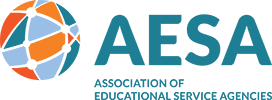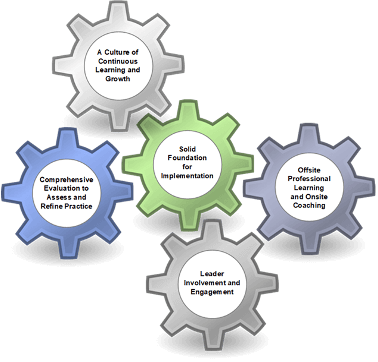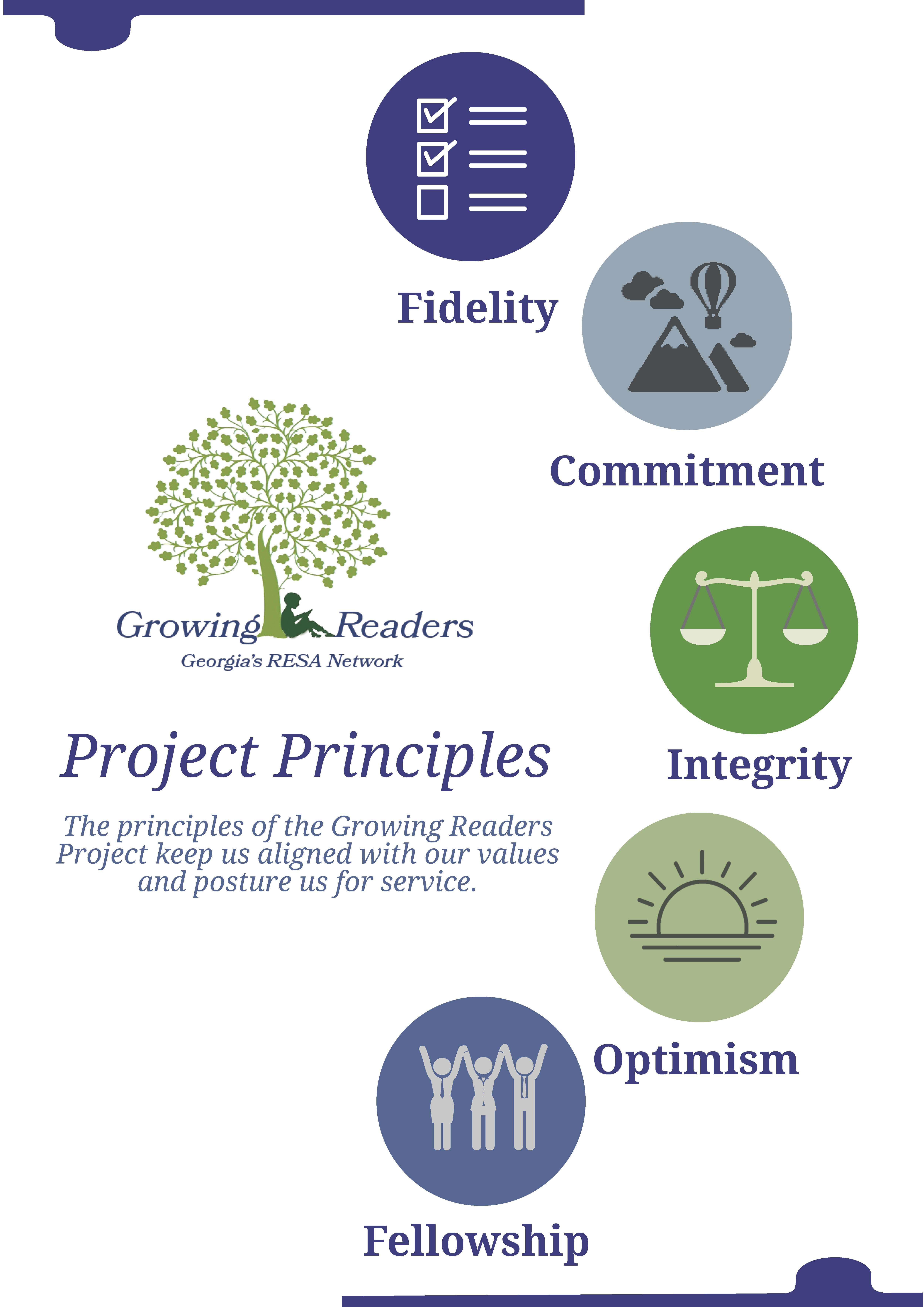
Growing Teachers: Five Essential Elements of a Large-Scale System of Learning
March 14, 2023
By: Kristy Kueber-Pope, Growing Readers Specialist, Metropolitan Regional Educational Service Agency. She can be reached by phone at 404-667-4734 and by email at kristy.kueber@mresa.org.
Kathy Matthews, Growing Readers Project Manager, Metropolitan Regional Educational Service Agency. She can be reached by phone at 770-324-3362 and by email at kathy.matthews@mresa.org.
A system is a regularly interacting and interdependent group of components working together toward a common goal. Large-scale initiatives require a well-designed system. In 2015, Georgia’s Regional Educational Service Agency (RESA) network was challenged by the Governor’s Office of Student Achievement (GOSA) to design a statewide initiative to increase the number of students reading proficiently by the end of third grade. This required RESAs to design as a network, rather than as individual RESAs serving member districts. RESAs needed a large-scale initiative and a well-designed system.
Seven representatives from across the RESA network were selected to work collaboratively to develop a professional learning project to support teachers. Over the course of the first seven years of implementation, the lessons learned from implementation and evaluation became five critical components of a system of learning and growth. These components work in tandem to guide our work, continually assess our work, and make necessary improvements to our work. When a problem arises, we look to the cogs of the system to find solutions. Each of the following cogs is essential to the large-scale system of learning. While each cog serves its own purpose, it regularly interacts with other cogs to drive improvement and reach established goals.
Cog One: A Solid Foundation for Implementation 
A solid foundation for implementation defines three overarching structures of the system. First, it defines exactly what we want teachers to know and do in their classrooms as a result of engaging in the initiative. The foundation for implementation clearly identifies the research on which we will focus, the goals and learning targets for teachers, and what classroom implementation will look like when we meet our learning targets and goals. Recognizing that research is self-correcting and ever-changing, the team developed a belief statement that identifies the important constructs that are critical to reading instruction. When professional learning is designed, the belief statement provides direction for any content that is developed. All professional learning is aligned and grounded in the belief statement.
In addition, the solid foundation defines how we operate as an organization. This includes our principles and values. As service providers, Growing Readers coaches value teachers, holding in high regard the knowledge, skills, and dispositions of the teachers we serve. Our approach is one of partnership in learning. The Growing Readers coaches who serve schools focus on building relationships with teachers, leaders, and students. Coaches work collaboratively with teachers to build on individual strengths. Growing Readers project principles keep us aligned with our values and posture us for service.
Finally, the solid foundation for implementation defines how the content and skills will be rolled out over the course of the project. Cohorts of Growing Readers teachers begin every two years. The diagram describes the rollout for the two-year project.
Effective large-scale initiatives are grounded in a solid foundation for implementation that aligns content to research, defines how the service agency operates, and the how content and skills will be rolled out to the participating teachers.
Cog Two: Offsite Professional Learning and Onsite Coaching
Professional learning that sticks occurs over time. Effective professional learning is not a “one-and-done” approach. It is grounded in clear and focused learning targets that define what participants should know and do. Growing Readers provides job-embedded professional learning. “Job-embedded professional development (JEPD) refers to teacher learning that is grounded in day-to-day teaching practice and is designed to enhance teachers’ content-specific instructional practices with the intent of improving student learning” (Darling-Hammond & McLaughlin, 1995; Hirsh, 2009). Growing Readers job-embedded professional learning includes multiple learning approaches such as training, modeling, coaching, and many more. Professional learning is grounded in trusting relationships between the teacher and the Growing Readers coach.
Growing Readers professional learning is organized into four cycles of learning that include four, two-day offsite trainings. These training events provide common expectations and learning for all participants by defining teacher instructional practices and content knowledge that supports implementation. During the offsite training sessions, teachers have opportunities to collaborate and network in school teams and grade-level teams. This allows collaboration with teachers from other buildings and opens doors to future communications. Teachers leave trainings knowing exactly what to do during the cycle of learning in the classroom.
Following each offsite professional learning session, Growing Readers coaches engage teachers in onsite coaching and support through intensive coaching rounds. Coaching rounds are directly focused on the implementation expectations from offsite professional learning. Coaches for Growing Readers partner with teachers to experiment with new practices and refine reading instruction together to improve outcomes for readers. Coaches listen to and support teachers and meet them where they are (just as teachers do with students) to build on their strengths.
Cog Three: Leader Involvement and Engagement
Leadership is a key component of successful implementation. Growing Readers engages leaders through offsite training sessions and onsite coaching and support. Leaders are engaged in networking with other administrators to share practices and support one another. Growing Readers coaches engage leaders in learning walks to admire teaching, learn about Growing Readers practices, and identify next steps. These actions equip leaders to define the vision for instruction, create support systems for implementation, replicate effective practices schoolwide, and celebrate success. Leader involvement and engagement goes beyond updates and check-ins regarding implementation and includes leaders in meaningful work to support teachers with learning and growth.
Cog Four: Comprehensive Evaluation
From inception, Growing Readers has been evaluated by the Governor’s Office of Student Achievement for program effectiveness. The evaluation of Growing Readers focuses on four areas:
- implementation consistency,
- teacher practice,
- RESA cohesiveness and collaboration, and
- student outcomes.
For each of the four evaluation areas, GOSA’s Research and Evaluation Team has created monitoring tools and protocols. The evaluation measures perceptions of educators and students, content knowledge of teachers, the implementation of practices, and student learning outcomes. The findings each year are used in revision and refinement of the Growing Readers system of learning.
Comprehensive evaluation allows programs and systems to gather and analyze information to drive improvements. The evaluation can lead to immediate, simple revisions that can improve results immensely. For example, our evaluation pointed to consistent results for offsite training sessions, whereas results for onsite coaching were less consistent in the amount of support and the focus of support. This information led to an intentional focus on onsite coaching methods, moves, and schedules to support the development of Growing Readers coaches. A program or system that remains the same over time hasn’t recognized its full potential. Create an evaluation that drives continuous improvement of the system.
Cog Five: Intentional Growth and Learning for the Growing Readers Team
Growing Readers is a learning organization. “Recognize that we all can get better at what we do,” is a norm valued by the Growing Readers team. The team engages in continuous learning and growth focused on deepening our understanding of current research in the field of reading, implementation of large-scale initiatives, coaching moves, coaching methods, classroom practice, and much more. In addition, Growing Readers partners with organizations and individuals who have a common goal to impact outcomes for readers. The system is continually refined to maximize its impact on teaching and learning. The chart shows revisions made to the system for the 2021 – 2023 cohort.
| Revisions to the Growing Readers System
2021 - 2023 |
Information that led to the revision |
| · Engaged leaders in learning walks to understand and admire the intentional work of teachers. | · Leaders had questions about the practices being implemented in classrooms. |
| · Added a new professional text to support phonics instruction. | · Identified phonics instruction as a missing element in many schools.
· Many students are not growing due difficulties with word recognition. |
| · Added a section to offsite professional learning on decodable texts. | · Research points to the need for access to a range of texts in students’ hands.
· Research suggests that 50% of phonics instruction should be application. |
| · Engaged coaches in peer learning partnerships to enhance practices in coaching. |
· Coaching approaches differed across the state. |
| · Added Georgia-based videos through a video project to capture models to use in professional learning for teachers, leaders, and coaches. | · In teacher perception surveys from professional learning sessions, teachers requested more videos.
· Teachers relate to students who have similar demographics to the population of students they serve. |
In his podcast, The Law of Intentionality, John Maxwell reminds us that you can’t grow others until you grow yourself and that growth must be intentional. Growing Readers coaches aren’t experts…they are endless learners.
Each component of the system of learning is vital to the success and growth of Growing Readers. The processes in which the team engages participants leads to the desired result: improved outcomes for readers in Georgia. The cogs in this system can be applied to any large-scale initiative. The table below provides guiding questions and sample products that will help replicate the system for any large-scale initiative that is developed.
Actions to Take to Develop a Large-Scale System of Learning
| Actions | Guiding Questions | Sample Products |
| Establish a solid foundation for implementation. | Content:
1. What research will guide the content? 2. What do we want teachers to be able to know and do? Values: 3. What do we value about those we will serve? 4. What principles will posture your agency for service? Rollout: 5. How do we provide service to participants? |
· Foundational belief statement
· Learning targets · Implementation expectations · Indicators of quality · Principles for service · Rollout plan |
| Develop a professional learning plan that includes classroom support. | 1. What do teachers need to be successful?
2. How will we engage teachers with the learning targets? 3. How will we prepare teachers to implement the expectations? 4. How will we support teachers in classrooms with implementation? 5. What resources are needed to support growth? |
· Presentations
· Handouts · Facilitator guides · Plan for coaching · One-pagers focused on targets |
| Develop an intentional plan for leader engagement. | 1. What do leaders need to know and understand about the work?
2. How will we engage leaders in networking opportunities? 3. How will we engage leaders in classroom visits that are focused on admiring growth? 4. How will we engage leaders in celebrating small wins? |
· Presentations
· Action plans · Network agendas · Schedule for classroom visits |
| Plan a comprehensive plan for evaluation. | 1. How will we gather participants perceptions?
2. How will we assess implementation of the rollout? 3. How will we assess classroom practice? 4. How will we assess teacher knowledge? 5. How will we know students are impacted? |
· Evaluation plan
· Evaluation tools · Evaluation results |
| Develop a plan to intentionally grow service providers. | 1. What do we need to know and be able to do?
2. How will we engage in learning? 3. What resources are needed to support our growth? |
· Intentional plan for growth
· Rollout plan for our growth |
Large-scale initiative success depends on the clarity and intentionality of the system. Each cog is dependent upon the other. Without one, the others simply don’t turn. Invest time building a comprehensive system. The time and deliberate preparation pay off exponentially.
References
- Darling-Hammond, L., & McLaughlin, M. W. (1995). Policies that support professional development in an era of reform. Phi Delta Kappan, 76(8), 597–604.
- Maxwell, J. (Host). (2019, August 7). The Law of Intentionality [Audio podcast episode]. In Maxwell Leadership Podcast. Maxwell Leadership. https://www.maxwellleadership.com/podcast/the-law-of-intentionality/


